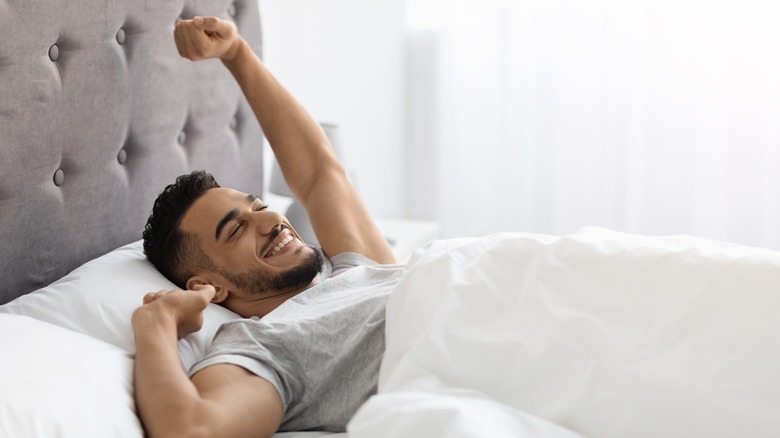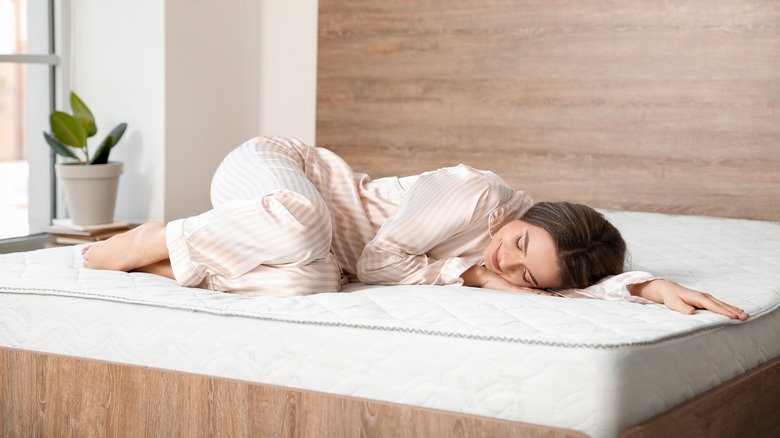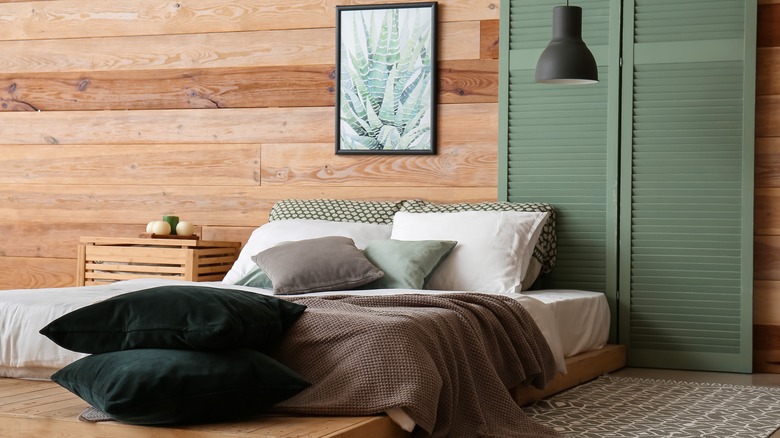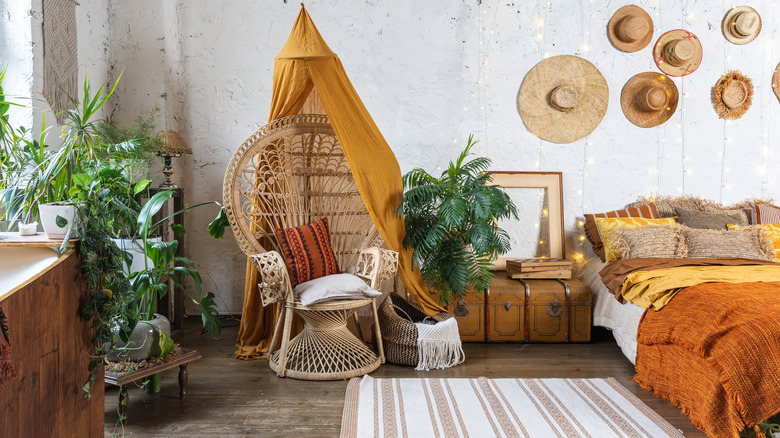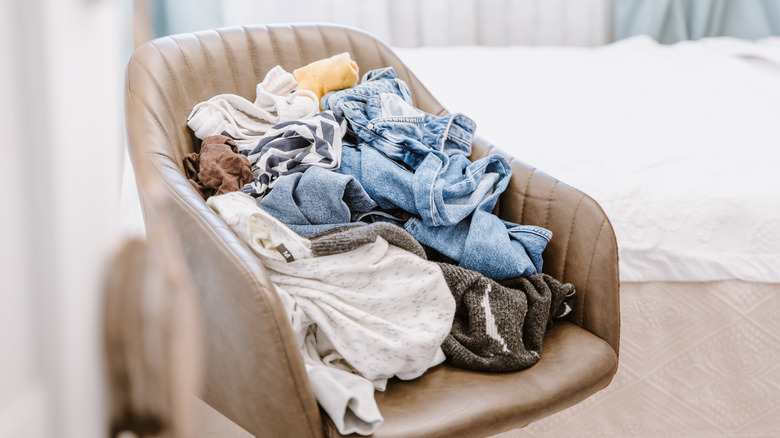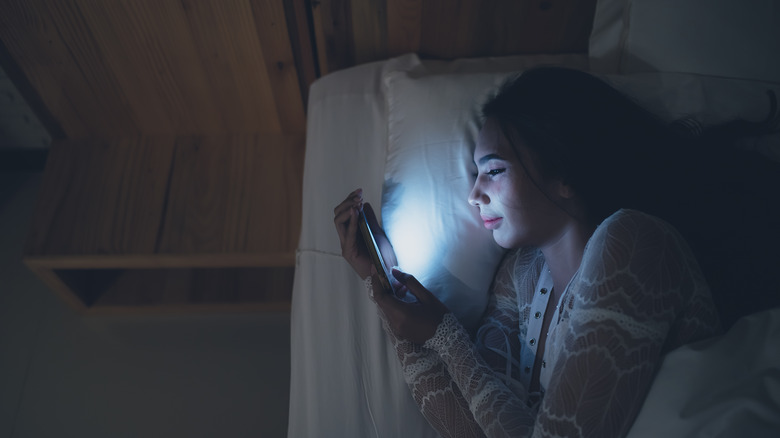How To Design The Perfect Bedroom For A Good Night's Sleep
It's a wonderful feeling to wake up refreshed and ready to face the day, but in order to do that, you first need to get a good night's sleep. If you find yourself struggling to wake up or in need of an extra cup of coffee to get going, your sleep environment may be to blame.
According to the Sleep Foundation, there are many elements that contribute to how well you sleep. One requirement for peaceful slumber is having your room at the best temperature. They recommend keeping your bedroom around 65 degrees Fahrenheit at night. This cooler environment triggers your body's natural response of lowering your core temperature when it's time to sleep. While room temperature is important for a restful night, so is the rest of your bedroom's environment. By making a few slight changes that put you in line with a holistic approach to designing your bedroom, you may be able to trade your groggy mornings for energy-infused dawns.
Find the right mattress
Getting a good night's sleep in an uncomfortable bed is almost impossible. It could be that your mattress is either too firm or too soft. Whatever is causing your restlessness, it's time to take note and make some changes.
A mattress that is too hard can hinder restful sleep because it won't allow you to get comfortable, causing you to toss and turn and then wake up with achy joints. What an unpleasant way to start your day! If a hard mattress is causing your sleep problems, an affordable solution is to top it with a mattress pad. Memory foam pads come in a variety of depths with features including cooling gel. This may be just the answer you need.
Alternatively, a mattress that's too soft can be a more expensive problem because it will probably require a replacement. Still, a good mattress is an investment, and since you'll spend about 33% of your life in bed, according to the National Library of Medicine, it'll certainly be money well-spent. If you have a partner with different firmness needs, consider getting an adjustable mattress so you can both enjoy your best sleep.
Buy comfortable bedding
Now that you have your mattress sorted, it's time to decide what kind of bedding you want to crawl into at night. There's no one-size-fits-all solution for the right bedding, so first, you want to identify your top priorities.
Perhaps scratchy sheets are the problem, or you're in a constant struggle with your partner over control of the blankets. If you tend to sleep hot at night, natural fibers are your best option, according to Runner's World. Cotton, bamboo, and linen in high thread counts are excellent options. For those who prioritize softness, microfiber is inexpensive but does not breathe as well as its organic counterparts. For the best sleep experience, remember to wash your bedding about once a week. No one wants to crawl into a stinky bed at night.
Selecting the right pillow is also vital to a restful night followed by a good morning. When shopping for pillows, consider your primary sleeping position. Some pillows are better for side sleepers, while others are perfect for those who sleep on their back. Higher end pillows have extra features, like air pockets, cooling foam, and antimicrobial coatings.
For those with anxiety at night, a weighted blanket can be the key to getting and staying asleep, according to Healthline. If you often toss and turn with worry or have certain health conditions, consider trying a weighted blanket to see if it helps you catch those elusive Zzzzs.
Add low lighting
As you plan lighting for your bedroom, keep in mind that you will need a variety. It's good to have an overhead light for daytime tasks, but you should also have low-light options to create a relaxing space for those hours before bed, according to Ideal Home. A little extra ambiance in the bedroom never hurts, either.
You likely have an overhead fixture for task lighting, but there are better options for the evening. Edison bulbs are pretty but, even though you can reduce the brightness, they still emit direct light in an area where diffused light is ideal. Select bedside lamps with shades and avoid bright light by using low-wattage, warm-tinted lightbulbs.
The bedroom is the perfect place to add mood lighting. While this type of lighting is not exactly functional — you're likely to get eye strain if you try to read a book by it — it's perfect for creating a relaxing space for meditation or listening to music. Electric candles are an effective way to create ambiance without worrying about what will happen if you fall asleep without blowing them out. Light colored curtains are another way to create a cozy atmosphere in your bedroom.
Remove clutter
The best bedding and lighting in the world will not make up for the negative effects of a cluttered room. A disorganized, messy space can affect mental health and cause loss of sleep, according to The Royal Australian College of General Practitioners. Physical clutter leads to mental clutter, and that can keep you from getting a good night's rest. Your eyes may be closed, but your mind knows there's a pile of unfolded laundry lurking in the corner.
While you work on your bedroom design, address the clutter. Get rid of clothes you don't wear, as well as stuff you don't need. While you're at it, move everything not bedroom-related to the appropriate spot in the house. The bedroom is not the best place to store extra electronics or dining room linens. Respect the functionality of the space and keep only what belongs in the bedroom by finding a more fitting home for everything else. Once you have decluttered your space, it should only take a few minutes each day to keep it clean and relaxing.
Evict blue light devices
This is a hard one, but there's no denying it. Blue light devices negatively affect sleep. According to WebMD, blue light items include televisions, cell phones, tablets, laptops, and more. Compared to all other colors of the light spectrum, blue light has the most impact on your circadian rhythm. In nature, you would wake up to a bright blue sky, which reduces the amount of melatonin your body makes. That's perfect for starting your day because that's when you want to be awake! However, artificial blue light has the same effect, and you need that naturally produced melatonin to drift off to sleep.
If you absolutely cannot remove your phone or tablet from your bedroom, consider installing a blue light filtering app to reduce the amount of blue your brain receives. Even with some of the blue light filtered out, try to avoid stressful or invigorating tasks right before bed. Let the work emails wait until morning and leave the games alone until daytime hours in order to allow your brain to relax.
